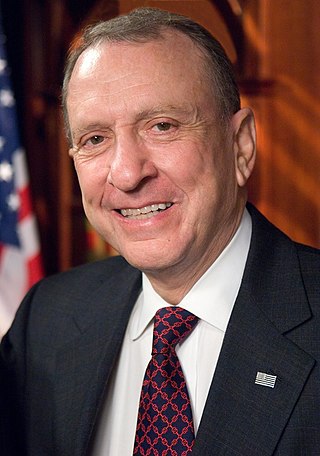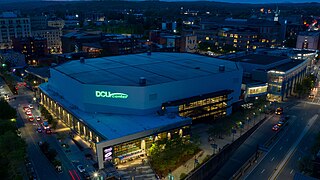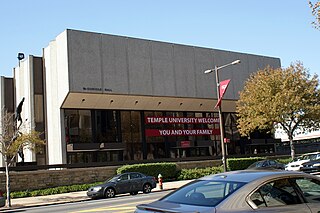
Arlen Specter was an American lawyer, author and politician who served as a United States Senator from Pennsylvania from 1981 to 2011. Specter was a Democrat from 1951 to 1965, then a Republican from 1965 until 2009, when he switched back to the Democratic Party. First elected in 1980, he was the longest-serving senator from Pennsylvania, having represented the state for 30 years.

The Spectrum was an indoor arena in Philadelphia, Pennsylvania. The arena opened in September 1967 as part of what is now known as the South Philadelphia Sports Complex. After several expansions of its seating capacity, it accommodated 18,168 for basketball and 17,380 for ice hockey, arena football, indoor soccer, and box lacrosse.

The DCU Center is an indoor arena and convention center complex in downtown Worcester, Massachusetts. The facility hosts a variety of events, including concerts, sporting events, family shows, conventions, trade-shows and meetings. It is owned by the City of Worcester and managed by ASM Global, a private management firm for public assembly facilities.

Folsom Field is an outdoor college football stadium located on the campus of the University of Colorado in Boulder, Colorado. It is the home field of the Colorado Buffaloes of the Big 12 Conference.

The UNT Coliseum is a 9,797-seat multi-purpose arena located in Denton, Texas, United States, built in 1973. While the arena's formal name is the UNT Coliseum, the building is more commonly referred to as the Super Pit, a nickname derived from its proximity to the former home of the Mean Green basketball teams, the Ken Bahnsen Gym, nicknamed the Snake Pit. Most signage inside the stadium uses the Super Pit name; the most prominent usage of the UNT Coliseum name is above a single new set of ticket windows added during 2017 renovations.

East Falls is a neighborhood in Lower Northwest, Philadelphia, Pennsylvania, United States. It lies on the east bank of the "Falls of the Schuylkill," cataracts submerged in 1822 by the Schuylkill Canal and Fairmount Water Works projects. East Falls sits next to the Germantown, Roxborough, Allegheny West, and the Nicetown-Tioga neighborhoods. Wissahickon Valley Park separates it from Manayunk, Philadelphia.

Daskalakis Athletic Center (DAC) is a 300,000 square feet (28,000 m2) athletic and recreational facility in Philadelphia, Pennsylvania.

The Victor R. Yanitelli, S.J. Recreational Life Center, known today as the Run Baby Run Arena, is a multipurpose athletic facility on the campus of Saint Peter's University, a private, coeducational Jesuit university in Jersey City, New Jersey. Notable for its air-supported "bubble," the Yanitelli Center opened on November 29, 1975 at a cost of $6 million and is named after the 17th president of the college.

McGonigle Hall is an athletic facility that is located on the campus of Temple University in Philadelphia, Pennsylvania. Temple women's basketball splits games between McGonigle Hall and the Liacouras Center. The gym is also home to Temple women's fencing, women's gymnastics, and volleyball.

Metro is a concert hall in Chicago, Illinois, United States, that plays host to a variety of local, regional and national emerging bands and musicians. The Metro was first opened in 1982. The capacity is 1,100, divided between the main floor and the balcony. The building housing Metro also houses Smart Bar underneath the main venue.

The Minneapolis Armory is a historic event center and former National Guard armory located in downtown Minneapolis, Minnesota, United States. Built by the Public Works Administration in 1936, the building was occupied by several Army and Naval Militia units of the Minnesota National Guard from its opening until 1985. The building is listed on the National Register of Historic Places.

The Drexel Dragons are the athletic teams of Drexel University in Philadelphia, Pennsylvania. The school's athletic program includes eighteen NCAA Division I sports including nine men's and nine women's teams, with most sports teams competing in the Coastal Athletic Association (CAA). Drexel's athletic department was ranked first in gender equity by U.S. News. The university has demonstrated a high level of student-athlete academic performance, with a 10-year NCAA graduation rate of 91% compared to a national average of 85%.

The Illinois National Guard Armory in Rockford, Illinois, is located at 605 Main St. and served as the headquarters for Illinois National Guard units of various designations for nearly 60 years. The building was added to the National Register of Historic Places in 2000.

The Centennial National Bank is a historic building in Philadelphia, Pennsylvania. Designed by noted Philadelphia architect Frank Furness and significant in his artistic development, it was built in 1876 as the headquarters of the eponymous bank that would be the fiscal agent of the Centennial Exposition. The building housed a branch of the First Pennsylvania Bank from 1956 until Drexel University purchased it c. 1976. Drexel renovated it between 2000-2002 and now uses it as an alumni center. The Centennial National Bank, described as "one of the best pieces of architecture in West Philadelphia," was placed on the National Register of Historic Places in 1971.

The Michael J. Hagan Arena of Saint Joseph's University is SJU's home court for men's and women's basketball. The new arena seats 4,200, which is 1,000 more than the Alumni Memorial Fieldhouse seated. A renovation begun in 2023 adds a concourse, larger offices and locker rooms, a Hall of Fame room, study rooms, basketball center, and practice facilities. 700 seats were added to the student section which puts the total at 1,700 and makes this part of the arena even more intimidating for opposing teams.

The Drexel Dragons men's basketball program represents intercollegiate men's basketball at Drexel University. The team currently competes in the Colonial Athletic Association in Division I of the National Collegiate Athletic Association (NCAA) and plays home games at the Daskalakis Athletic Center in Philadelphia, Pennsylvania. Drexel last appeared in the NCAA tournament in 2021.

The 1992 United States Senate election in Pennsylvania was held on November 3, 1992. Incumbent Republican U.S. Senator Arlen Specter narrowly won re-election to a third term, garnering just forty-nine percent of the vote in what was described by The Philadelphia Inquirer as a "massive turnout for Bill Clinton."

The Kingston Armory is an historic National Guard armory that is located in Kingston, Luzerne County, Pennsylvania.

Columbia Township Auditorium, also known as Township Auditorium, is a historic auditorium located in Columbia, South Carolina. It was built in 1930, and is a three-story, brick building with a Doric order columned portico in the Georgian Revival style. It was added to the National Register of Historic Places in 2005, and in 2009 it underwent a complete renovation/modernization that saw the architects/facility win national awards for historic preservation/renovation. The auditorium has a seating capacity of 3,072 for standard concert seating and 3,383 with general admission floor seating.

























